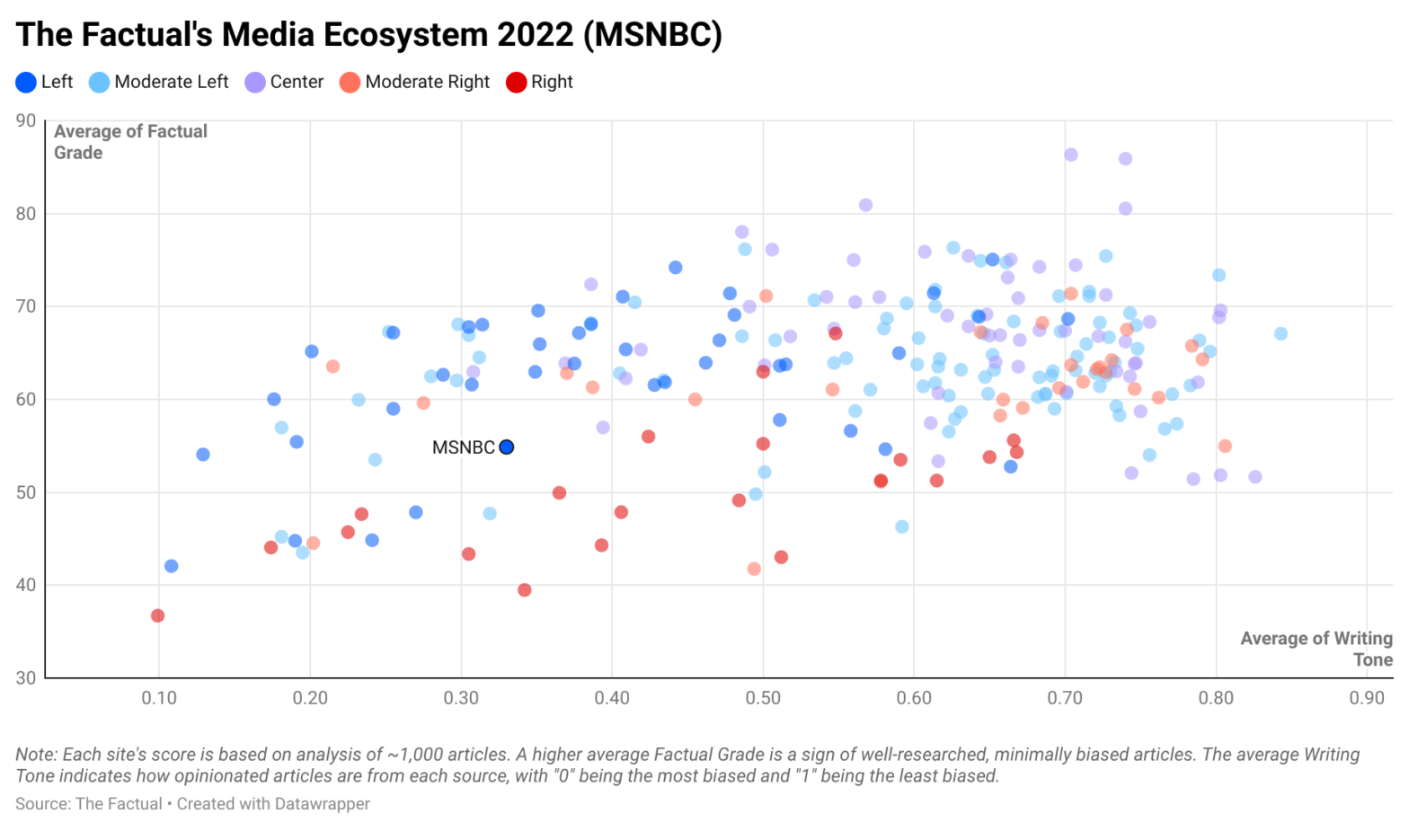MSNBC is often seen as a left-leaning version of Fox News, producing highly biased or opinionated news in lieu of traditional “straight” news reporting. The television network and news site are commonly under fire from both sides of the political spectrum—from the right for being a vocal outlet of liberal perspectives and from the progressive left for being the mouthpiece of the establishment center-left. The quality of their news stories has also come under fire: a 2018 Knight Foundation/Gallup survey put MSNBC as the third-most biased major news site, after Fox News and Breitbart. So, how reliable is news content from MSNBC and how biased is its reporting?
Note: This analysis focuses solely on written articles published through MSNBC’s online news site. It does not account for the organization’s television presence.
How Does The Factual Rate News Sources?
The Factual analyzes more than 10,000 news stories every day to help readers find the most informative, least-biased articles. Our news-rating algorithm scores each article along four metrics: (1) cited sources and quotes, (2) publication history, (3) writing tone, and (4) author expertise. These scores combine in a weighted average we call a Factual Grade, which ranges from 0–100%. (See our How It Works page to learn more about our algorithm.)
For this study, we analyzed ~1,000 articles each from 240 news sources. The average Factual Grade for the entire dataset was 62.5%. Based on these averages, we can compare the performance of news sites across the media ecosystem. The entire dataset can be explored in greater detail here.
How Factual Is MSNBC?
MSNBC scored an average Factual Grade of 54.9%, placing it in the 17th percentile of our dataset. MSNBC’s low scores can be explained by poor performance along the metrics that make up each Factual Grade. For example, most articles include minimal links to external sources or link only to other MSNBC articles. Likewise, the site’s authors exhibit varying levels of topical expertise, meaning that many of them do not have a demonstrated track record of covering specific topics or have only published low-scoring articles. Finally, articles from the site use particularly biased language rather than neutrally conveying information.
Like any news source, scores for articles from MSNBC vary widely based on factors like author expertise and cited evidence. For example, some scored above 70%, while many others scored below 50%.
Please check your email for instructions to ensure that the newsletter arrives in your inbox tomorrow.
How Opinionated Is MSNBC?
One of the metrics The Factual uses is the Writing Tone, which measures how opinionated the writing is in an article. For this metric, the algorithm looks for signs of subjective commentary (e.g., first person pronouns and unnecessary adverbs), as well as the emotional nature of selected words, and sees how prevalent they are for a given length of text. More neutral text receives higher ratings, with “0” being the most opinionated and “1” being the most neutral.
MSNBC had an average Writing Tone score of 0.33, placing it in the 15th percentile in our dataset for this metric. This score shows that the site is highly prone to using biased and opinionated language in its news articles. This is well captured by headlines such as “America’s paid family leave situation is a scandal and frankly insane” and “When Republicans’ hostility toward democracy gets overt.”
What Is MSNBC’s Political Bias?
The Factual classifies news sites by political bias as either Left, Moderate Left, Center, Moderate Right, or Right. This classification comes from third-party assessments from media bias organizations such as AllSides and Media Bias/Fact Check (MBFC). Based on this data, The Factual assigns MSNBC a Left bias.
AllSides rates MSNBC as having a “Left” bias based on independent research, third-party analysis, and 29,208 community ratings. To support this claim, AllSides highlights MSNBC’s own proclamation of having a liberal bias (in 2013, their website had the tagline “What Progressives Have Been Waiting For”) and points to a 2014 Pew study that put 49% of the site’s audience as left-of-center. They also highlight MSNBC’s role in spreading a misleading story regarding the death of a Capitol Officer during the Capitol Riot in 2021.
MBFC similarly classifies MSNBC as “Left” due to “story selection that consistently favors the establishment left.” They also warn about the factual quality of information from the site, noting failed fact checks on at least three occasions. MBFC highlights that MSNBC receives frequent accusations of strong bias. They also point out that, in addition to right-wing critiques, MSNBC is frequently maligned by the progressive left. Finally, MBFC provides at least 7 examples of failed fact checks.
Please check your email for instructions to ensure that the newsletter arrives in your inbox tomorrow.
Who Owns MSNBC?
MSNBC is owned by NBCUniversal News Group, a joint holding company founded by Comcast and General Electric. The site was first founded in 1996 under a partnership between Microsoft and NBC. Microsoft has since divested from the company, and in 2015, MSNBC split from NBC editorially.
Why Does It Matter?
News articles always have some bias because all authors have some frame of reference within which they describe a story. Political bias ratings are helpful in understanding this framing. However, it can be more beneficial to know how factual an article is based on quantifiable metrics that can be seen across the media ecosystem, such as cited evidence, author expertise, and writing tone. This is what The Factual ascertains.
Reading several, highly rated articles from across the political spectrum helps counter the bias of any news source or story. To have the day’s most factual news stories delivered to your inbox every morning, subscribe to our daily newsletter.
Article updated on September 19, 2022 to reflect new data.

